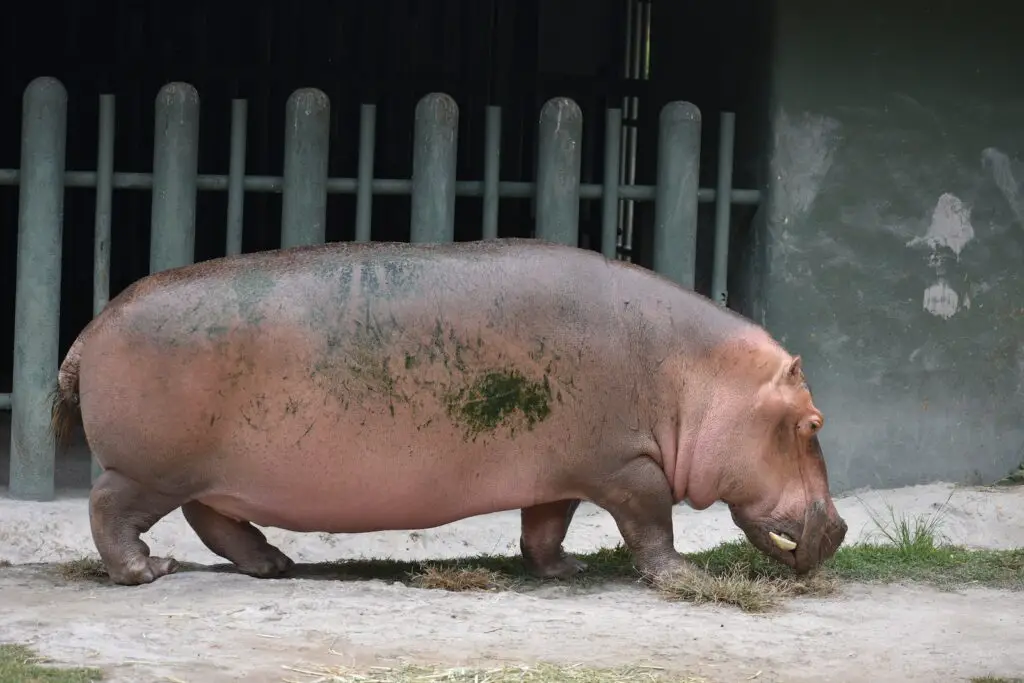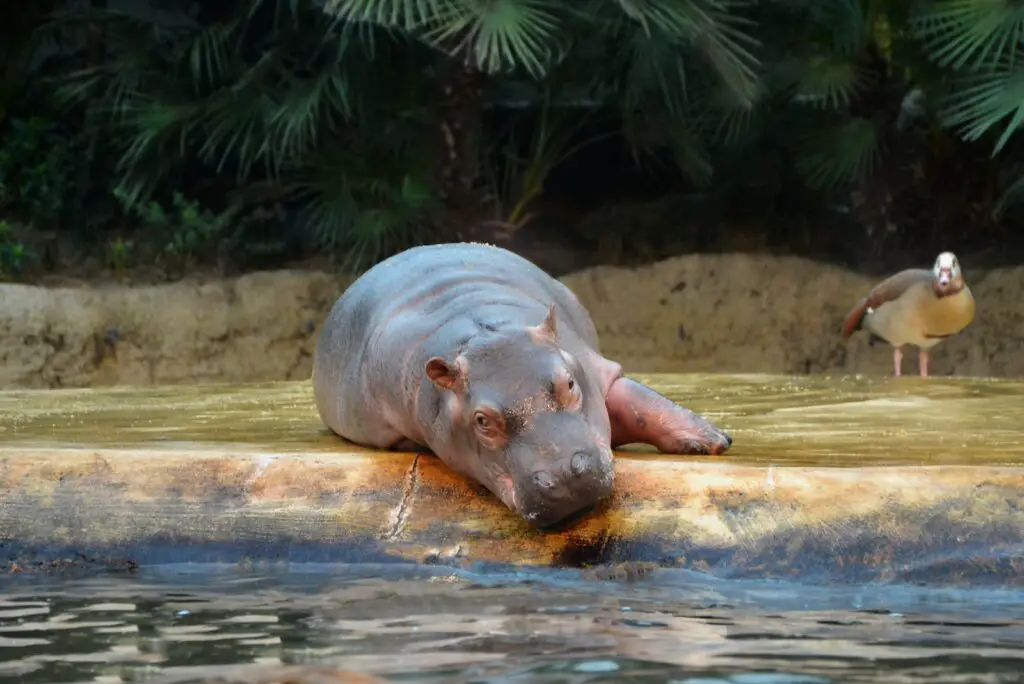Why do Hippos spray poop?
Hippos spray their poop to mark their territory and communicate with one another. This is referred to as “dung showering” or “faecal raining,” and it involves the hippo rapidly twirling its tail while defecating, causing the faeces to fly in all directions.
Hippos can spread their scent and establish dominance in the area by doing so.
The odour of their faeces also attracts potential mates and deters rival males from invading their territory.
While the sight and smell of hippos spraying their poop may be repulsive to humans, it is a natural and necessary behaviour for these animals in the wild.
Hippos are well recognised for their aggressive territorial behaviour, and they employ a range of tactics to demarcate their territory and establish their superiority over other animals.
They use vocalisations including grunting, screaming, and honking in addition to spraying their faeces to make their presence known to other hippos.
Hippos are among the most deadly animals in Africa and are known to be extremely aggressive creatures.
They may quickly destroy a person or animal with a single bite thanks to their strong jaws. Consequently, when viewing hippos in the wild, it’s crucial to always use caution and maintain a safe distance.
Hippos are intriguing animals with an unusual and interesting existence, despite their aggressive behaviour.
To stay cool and shield their delicate skin from the sun, they spend the most of their time in water. They also have a distinctive technique of moving around underwater by pushing off the bottom with their feet.
Hippos are sociable creatures which live in packs of up to 30 people, typically with a dominant male in charge.
They are herbivores and typically consume grass, though they have also been observed occasionally eating fruits and aquatic plants.
In conclusion, while the behavior of hippos spraying their poop may seem strange to us, it’s an important aspect of their natural behavior and helps them communicate and establish their presence in the wild.

Why do hippos poop while fighting?
Because it is a natural and uncontrollable reaction to the anxiety and excitement of the fight, hippos frequently poop when engaging in fight. The term “defecation under stress” (DUS) refers to this phenomenon.
Hippos’ bodies produce more waste when they are anxious or agitated, which speeds up their digestion process.
Moreover, the muscles in their anus loosen, making it simpler for them to urinate. Even if the hippo does not purposefully try to poop during a fight, this still occurs.
Moreover, hippos frequently engage in combat over territory or resources like mates or water, and they can scare an adversary by smelling like a threat.
It’s important to note that hippos are highly aggressive animals and should be observed from a safe distance.
Even if they are not intentionally targeting humans, they can cause serious injury or death with their powerful jaws and aggressive behavior.
Why do hippos poop in the water?
Hippos poop in the water for a number of reasons. One of the primary reasons is that they spend a significant amount of time in the water to stay cool and protect their sensitive skin from the sun.
Pooping in the water allows them to avoid the heat and potential sunburns that would result from coming out of the water to poop.
Furthermore, hippos are herbivores who live primarily on grass. Grass is difficult to digest, so hippos must consume a lot of it to get enough nutrients.
This means they generate a lot of waste, which they must dispose of on a regular basis.
Pooping in the water spreads their faeces over a larger area, reducing waste concentration in any one location and preventing it from piling up on land.
Hippos are also known for their territorial behaviour, and they use poop to mark their territory and communicate with other hippos.
They can spread their scent over a larger area and establish their presence in their territory by pooping in the water.
It is important to note that hippos poop in the water as well as drink from it. Their digestive system, however, has evolved to handle this, and they can filter out and consume only the water they require while avoiding ingestion of their own waste.

Is hippo poop toxic?
While hippo poop is not inherently toxic, it can contain harmful bacteria and parasites that, if consumed by humans or animals, can cause illness or infection.
Furthermore, large amounts of hippo poop in one area may cause a drop in oxygen levels in the water, endangering aquatic life.
While hippo poop is not inherently toxic, it can contain harmful bacteria such as E. coli, Salmonella, and Campylobacter, which can cause gastrointestinal illnesses in humans if ingested.
Additionally, hippo poop can contain parasites such as Cryptosporidium and Giardia, which can also cause illness in humans and other animals.
In addition, a lot of hippo poop in one place can cause eutrophication, which is when the water gets enriched with nutrients like nitrogen and phosphorus, which promotes the growth of bacteria and algae. As a result, the water’s oxygen levels may drop, killing aquatic life and resulting in “dead zones” in the water.
Because of this, it’s crucial to use caution while handling hippo poop and to avoid swimming or drinking water in places where there is a lot of it.
In order to avoid contaminating water sources, it’s crucial to properly dispose of human waste as well as to abide by local laws and regulations for the disposal of animal waste.
Hippo poop can benefit the ecosystem in addition to these possible health problems.
As a natural fertiliser, the nutrients in hippo faeces can encourage the growth of aquatic plants and boost biodiversity in the area.
Also, the fragrance of hippo faeces may draw insects, which in turn may provide food for other animals.
Ultimately, hippo poop is a natural and essential component of the environment even though it has the potential to be detrimental.
To reduce any negative impacts on the environment, it’s crucial to take the proper procedures when handling hippo poop and to respect the animals’ natural habitat.
In general, it’s best to observe hippos from a safe distance and to respect their natural habitat to avoid any potential health risks.
Some FAQs related to hippo poop
1. How often do hippos poop?
Hippos can poop anywhere from 8 to 10 times per day, producing an average of 22 pounds (10 kg) of poop per hippo per day.
2. Does hippo poop have a distinct smell?
Yes, hippo poop has a distinctive odor due to the presence of certain chemicals and compounds, including butyric acid and skatole.
3. Is hippo poop used for any purposes?
Yes, hippo poop can be used as a natural fertilizer due to its high nutrient content. In some areas, it is collected and used in agriculture to promote plant growth.
4. Can hippos get sick from their own poop?
While hippos are adapted to living in and around their own waste, they can still be susceptible to certain illnesses and infections if exposed to high levels of harmful bacteria or parasites.
5. Can hippo poop be harmful to other animals?
Yes, if there is a large concentration of hippo poop in a particular area, it can lead to a decrease in oxygen levels in the water, which can be harmful to other aquatic life. Additionally, the harmful bacteria and parasites in hippo poop can infect other animals that come into contact with it.
6. How do hippos clean themselves after pooping in the water?
Hippos clean themselves by shaking or twisting their bodies to get rid of any excess poop or debris. They may also swish the water with their tails to help remove any remaining waste.
7. Can hippo poop be used to make biogas?
Yes, hippo poop can be used to produce biogas through a process called anaerobic digestion, in which bacteria break down the organic matter in the poop to produce methane gas.
8. How can hippo poop affect human health?
Because of the presence of harmful bacteria and parasites, ingesting hippo poop has the potential to cause gastrointestinal illnesses in humans. Furthermore, the odour of hippo poop is unpleasant and may cause respiratory irritation in some people.
9. How can people avoid coming into contact with hippo poop?
To avoid coming into contact with hippo poop, keep a safe distance from hippos and avoid swimming or drinking water in areas where there is a lot of hippo poop. It is also critical to properly dispose of human waste to avoid contamination of water sources, as well as to follow local regulations and guidelines for animal waste disposal in the area.
10. How does hippo poop compare to other animal waste in terms of nutrient content?
Hippo poop is relatively high in nutrients compared to the waste of many other animals, owing to the fact that hippos must eat a lot of grass to get enough nutrients. Hippo poop is a valuable natural fertiliser due to its high nutrient content.
